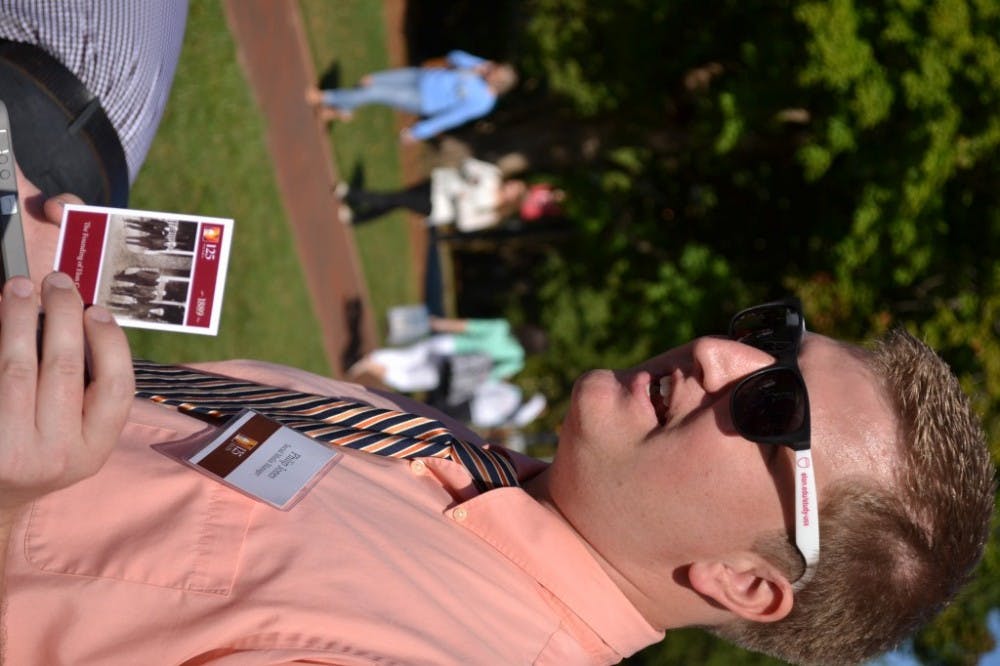Elon University doesn’t do anything particularly special to celebrate its birthday.
There are no celebratory maroon and gold cakes or lavish parties hosted by President Leo Lambert, and the university has never treated itself for its birthday.
But this year is different. The 2013-2014 academic year marks Elon’s quasquicentennial. Translation: Elon is 125 years old.
To commemorate this milestone, the Office of University Communications has figured out a way to celebrate by issuing a collectible set of 25 historic cards.
Dan Anderson, vice president of University Communications, along with a team of motivated members of Elon’s staff, created the cards to outline the rich and complex history of the university. The cards have been available for free at College Coffee since Aug. 27, and a new card will be issued each week through Nov. 5.
“You get to learn a little bit of history, and it’s not so much to digest,” Anderson said.
He and his team organized the details of this project during the summer, consolidating 125 years into 25 cards.
Anderson said he was aided by Keren Rivas, assistant director of University Communications for Alumni, in editing Elon’s 125-year history into 96 words and 694 characters (including spaces) in order to fit write-ups on each card.
Anderson also said they made the information manageable by designating a theme for each card. Each one contains a subject and represents an era handpicked by Anderson and Rivas.
“We had a lot of Elon’s history chronicled already, so we went through that timeline and determined that the set of cards having 25 would be the right number — 125 would be too many,” Anderson said. “From there, we went about choosing the different subjects for the cards and finding photos to match. We wanted to include big events and find themes that were important.”
Topics range from faculty and academic growth to buildings on campus, to name a few.
“It’s a nice variety,” Anderson said.
Although Anderson spoke of the collectible card production frankly, the process was indeed demanding, according to Katie Nash, archivist at Belk Library.
“When we had to research some of [the information], we had to consult a lot of different sources and weed through a lot of information to synthesize it down to a page or two of relevant information they could use,” Nash said. “So that was really time-consuming on our part.”
Nash said she was in charge of the research side of the process, although she had help from other librarians. Once Anderson and Rivas came up with the 25 themes, Nash said she dove into Elon’s photo archives and Durward Stoke’s book, “Elon College: Its History and Traditions,” to get information on Elon’s past.
[quote] You get to learn a little bit of history, and it’s not so much to digest" — Dan Anderson, vice president of University Communications [/quote]
Nash said the university’s modern information was the most challenging to gather.
“Some of the more current [cards] were actually surprisingly a little more time-consuming and difficult,” she said. “We had to be creative about where we found the information.”
As far as a favorite theme, Nash said she’s partial to the railroad card.
“That was a mode of transportation,” Nash said. “It was sort of like the highway system or the subway. I mean, it’s how students got here — it’s still here. It’s not such an old transportation technology that it doesn’t exist anymore. It’s one of the many that has a national context but then also zooms in and has a very Elon-focused context, too.”
In addition to being available at College Coffee each week, there will be complete sets of cards available at the Martin Alumni Center Nov. 8-9 during Homecoming. The cards will also be on display at the Isabella Cannon Room in the Center for the Arts for a historical exhibit during Homecoming.
“We’re going to use the walls of that gallery to tell Elon’s story — it’s history,” Anderson said.


